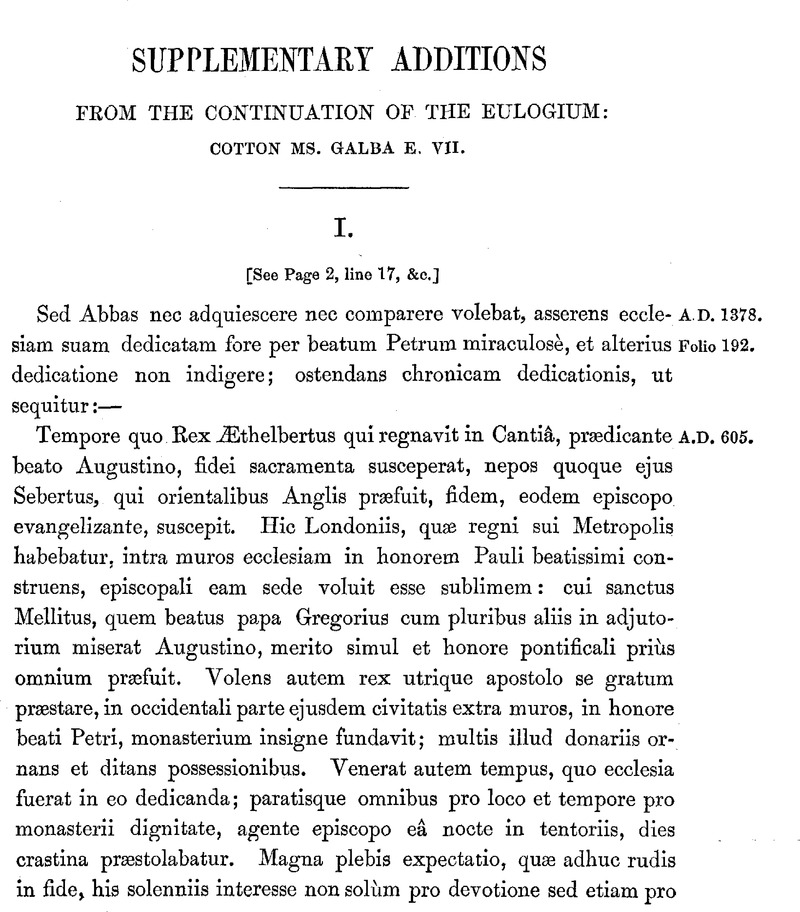No CrossRef data available.
Article contents
Supplementary Additions
Published online by Cambridge University Press: 23 February 2010
Abstract

- Type
- Appendix
- Information
- Camden Old Series , Volume 64: An English Chronicle of the reigns of Richard II, Henry IV., Henry V., and Henry VI. written before the year 1471; with an Appendix, containing the 18th and 19th years of Richard II. and the Parliament at Bury St. Edmund's, 25th Henry VI. and Supplementary Additions from the Cotton. MS. Chronicle called “Eulogium.” , December 1856 , pp. 119 - 142
- Copyright
- Copyright © Royal Historical Society 1856
References
page 121 note * “Die Dominicâ, in vigiliâ Annunciationis Dominictæ, magna classis navium Flandriæ, Galliæ, et Hispaniæ …. conspicitur.” (Walsingham.)
page 122 note * The Purification was Feb. 2nd. The “Merciless Parliament” met on the day following.
page 123 note * There is a confusion in the history here—see note Page 4, last line. The occasion of this second assembly of forces on the part of the Lords was the discovery of the King's treachery in having secretly sent Robert de Vere to collect troops in Cheshire. His defeat at Radcote Bridge was on Dec. 20th.
page 125 note * See note to page 6, line 32.
page 125 note † This parliament met at “Westminster, January 17th, 13 Ric. II. 1390, and was dissolved March 2nd. (Rot. Parl.)
page 126 note * This Parliament at Winchester was in 16 Ric. II. 1393. It commenced “Lundy en les oeptaves de Seint Hiller, (Jan. 20,) l'an du regne nostre Seigneur le Roi seszisme,” and terminated “Lundy le disme jour de Feverer.” (Rot. Parl.)
page 126 note † This again must mean the Parliament at Winchester, 16 Ric. II., 1393. From Froissart we learn that the conditions of peace were something of this kind, but they are not extant on the Rolls of Parliament.
page 127 note * It is not unlikely that the following events occurred in this parliament. The dukedom of Gruienne had been conferred upon Lancaster, March 2, 1390 (Rymer, vii. 659) ; but in the July (1392) preceding this Parliament, ambassadors had arrived to remonstrate with the king on the appointment. Some assertion of his rights on the part of Lancaster may have been distorted in this way.
page 128 note * Or immediately after. (Rymer, vii. 790.)
page 128 note † After the 13th. (Rymer, vii. 789.)
page 128 note ‡ The first document in Rymer relative to Richard's marriage with Isabella of Valois, is dated July 8, 1395. The 30 years' truce was ratified by the King of France, March 11, 1396 (Rymer, vii. 832), and finally sworn to by both kings about the end of October.
page 130 note * A commission had been issued to Sir William Rickhill for examining the Duke of Gloucester, on August 17th, (Rymer, viii. 13. Eot. Parl. iii. 378.) At midnight, September 5th, he was ordered by a royal messenger to join the Earl Marshal at Dover the following evening and accompany him to Calais, where a special commission was handed to him. The Duke's written answer was returned on the Saturday. (Rot. Parl. iii. 430–432.)
page 132 note * The Commons prayed for judgment against the Archbishop on this day, but sentence was not given till the 25th. (Rot. Parl. iii. 351.)
page 137 note * Battle of Homildon Hill, Sept. 14th.
page 137 note † Carte, ii. 656.
page 141 note * Bishop Wilkins has quoted the above paragraph. (Concil. iii, 282.)
page 142 note * At the battle of Bramham Moor, Feb. 18th.




